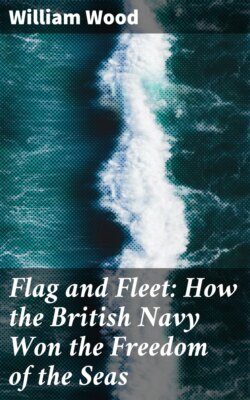Читать книгу Flag and Fleet: How the British Navy Won the Freedom of the Seas - William Wood - Страница 27
На сайте Литреса книга снята с продажи.
CELTIC BRITAIN UNDER ROME
(55 B.C.-410 A.D.)
ОглавлениеTable of Contents
When Caesar was conquering the Celts of Western France he found that one of their strongest tribes, the Veneti, had been joined by two hundred and twenty vessels manned by their fellow-Celts from southern Britain. The united fleets of the Celts were bigger than any Roman force that Caesar could get afloat. Moreover, Caesar had nothing but rowboats, which he was obliged to build on the spot; while the Celts had real ships, which towered above his rowboats by a good ten feet. But, after cutting the Celtic rigging with scythes lashed to poles, the well-trained Roman soldiers made short work of the Celts. The Battle of the Loire seems to have been the only big sea fight the Celts of Britain ever fought. After this they left the sea to their invaders, who thus had a great advantage over them ashore.
The fact is that the Celts of the southern seaports were the only ones who understood shipbuilding, which they had learnt from the Phoenicians, and the only ones who were civilized enough to unite among themselves and with their fellow-Celts in what now is France but then was Gaul. The rest were mere tribesmen under chiefs who were often squabbling with one another, and who never formed anything like an all-Celtic army. For most of them a navy was out of the question, as they only used the light, open-work, basket-like coracles covered with skins—about as useful for fighting the Romans at sea as bark canoes would be against real men-of-war. The Roman conquest of Britain was therefore made by the army, each conqueror, from Caesar on, winning battles farther and farther north, until a fortified Roman wall was built across the narrow neck of land between the Forth and Clyde. Along these thirty-six miles the Romans kept guard against the Picts and other Highland tribes.
The Roman fleet was of course used at all times to guard the seaways between Britain and the rest of the Roman Empire, as well as to carry supplies along the coast when the army was fighting near by. This gave the Romans the usual immense advantage of sea-transport over land-transport, never less than ten to one and often very much more. The Romans could thus keep their army supplied with everything it needed. The Celts could not. Eighteen hundred years after Caesar's first landing in Britain, Wolfe, the victor of Quebec, noticed the same immense advantage enjoyed by King George's army over Prince Charlie's, owing to the same sort of difference in transport, King George's army having a fleet to keep it well supplied, while Prince Charlie's had nothing but slow and scanty land transport, sometimes more dead than alive.
The only real fighting the Romans had to do afloat was against the Norsemen, who sailed out of every harbour from Norway round to Flanders and swooped down on every vessel or coast settlement they thought they had a chance of taking. To keep these pirates in check Carausius was made "Count of the Saxon Shore". It was a case of setting a thief to catch a thief; for Carausius was a Fleming and a bit of a pirate himself. He soon became so strong at sea that he not only kept the other Norsemen off but began to set up as a king on his own account. He seized Boulogne, harried the Roman shipping on the coasts of France, and joined forces with those Franks whom the Romans had sent into the Black Sea to check the Scythians and other wild tribes from the East. The Franks were themselves Norsemen, who afterwards settled in Gaul and became the forefathers of the modern French. So Rome was now threatened by a naval league of hardy Norsemen, from the Black Sea, through the Mediterranean, and all the way round to that "Saxon Shore" of eastern Britain which was itself in danger from Norsemen living on the other side of the North Sea. Once more, however, the Romans won the day. The Emperor Constantius caught the Franks before they could join Carausius and smashed their fleet near Gibraltar. He then went to Gaul and made ready a fleet at the mouth of the Seine, near Le Havre, which was a British base during the Great War against the Germans. Meanwhile Carausius was killed by his second-in-command, Allectus, who sailed from the Isle of Wight to attack Constantius, who himself sailed for Britain at the very same time. A dense fog came on. The two fleets never met. Constantius landed. Allectus then followed him ashore and was beaten and killed in a purely land battle.
This was a little before the year 300; by which time the Roman Empire was beginning to rot away, because the Romans were becoming softer and fewer, and because they were hiring more and more strangers to fight for them, instead of keeping up their own old breed of first-class fighting men. By 410 Rome itself was in such danger that they took their last ships and soldiers away from Celtic Britain, which at once became the prey of the first good fighting men who came that way; because the Celts, never united enough to make a proper army or navy of their own, were now weaker than ever, after having had their country defended by other people for the last four hundred years.
